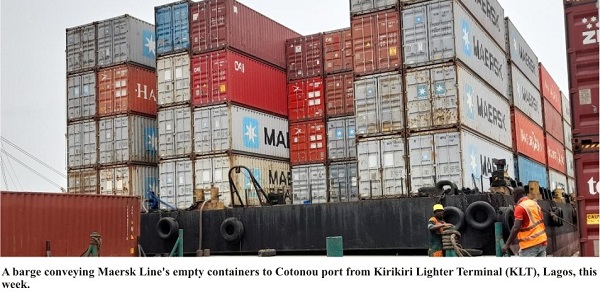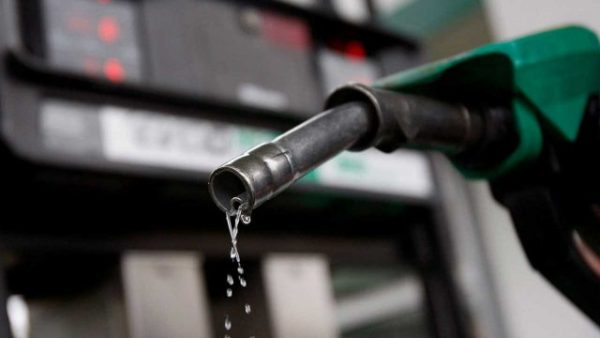Port Crisis: Nigeria Tranships Empty Containers To Cotonou Using Barges
 · Invisible toll-gates on Tin Can port access roads
· Invisible toll-gates on Tin Can port access roads
· ‘Priority’ trucks defy Eto, export trucks trapped for weeks
By Kenneth Jukpor
Following the myriad of port challenges in Nigeria, shipping companies in the country have begun exporting empty containers to Cotonou port using barges.
While the development comes as a snag amid Nigeria’s lofty goal to have the hub ports in the West and Central African sub-region, challenges which led to this transshipment include; port access chaos, shallow draft, seaside congestion, among others.
A maiden barge voyage of 480 containers has been organized by Maersk Line in collaboration with Clarion Shipping to take place this week from Kirikiri Lighter Terminal (KLT) in Lagos to Cotonou port in the Republic of Benin.
The barge named ‘ENL Triumph 2’ will be propelled at Beaufort Force 5 by a tugboat ‘ENL Superior’ in a 3-day voyage and it is expected to convey consignments back to Lagos.
Recall that freight charges from Asia and Europe recently increased from $3,000 to $12,000- $15,000 as a result of scarcity of empty containers that are stuck in Lagos port and environs.
Speaking with MMS Plus on the arrangement, the Legal Adviser to Clarion Shipping Company (WA) Limited, Barr. Emmanuel Chekwube Osonwa described the development as a “high risk and very expensive venture”.
His words: “This barge will take 480 containers because we have to adhere to safety and operational standards. The barge can take up to 500 containers but we are being mindful of lots of precautions. The engineers, who designed the barge with all required equipment, have advised we do 480 containers. The containers will be fastened with slugs and lashed together. Although the containers will be stacked five each, every container has two slugs as they are fastened to themselves and lashed together from the deck to the top.”
“It costs huge sums to get an ocean-going tugboat and a barge of such huge size. We chartered the tugboat from ENL and it is a top quality one that can transverse any waters. The tug is propelling at Beaufort Force 5 which means it can move at a very high speed.”
While admitting that the venture is very expensive, Osonwa encouraged more shipping companies and logistics companies to explore such options as long as they will be delivering quality services.
“I would advise anyone who wants to make similar efforts to utilize quality barges and tugboats to prevent mishaps. This way, we can return most of the empty containers that have become a logistics burden for Lagos ports,” he opined.
The maritime lawyer stated that it is unfortunate that empty containers aren’t returned and Nigerian shippers are losing their container deposits and paying additional charges for a fault that wasn’t theirs.
“For the truck owners, the delay in dropping these containers leads to loss of revenue that could have been earned if the trucks speedily engaged other businesses. Bad roads have also worsened the situation in recent years but the major problem has been the empty containers which equally delays the turnaround time of ships at Lagos ports. This explains why the ships drop the containers they brought and return empty to their respective nations or other ports.”
“These problems led Clarion Shipping Company in partnership with Maersk Line to explore venture into barging empty containers from Lagos to Cotonou. This will set the record as the first time empty containers are being moved directly to Cotonou port via barges. At Cotonou port, foreign ships have access to come in and move empty containers. Some of these ships aren’t willing to come here because of the numerous bottlenecks from Secure Anchorage Area (SAA) to draft and quay apron challenges. Since it’s easier for these ships to access Cotonou port, we decided to partner with Maersk Line to move empty containers to Cotonou via barges,” he added.
In another development, truckers have an ongoing fraudulent system of truck movement along the Tin Can/ Mile 2 axis which sees security agents allow certain trucks access to the ports over others under the guise of ‘priority’ trucks.
Our correspondent also discovered three major extortion points on the route during an investigative tour last week.
At these extortion points commonly referred to as toll-gates by truckers, monies ranging from N2,000 to N5,000 are forcefully collected by touts on behalf of security agents present at the same locations.
The tool-gates are at Fatgbems filling by Jakande bus stop, Otto-Wharf junction and the Coconut bridge close to Tin Can port gate.
In a bid to get firsthand reports of the practice, MMS Plus also interacted with some truckers between Berger and Mile 2 axis.
Samuel Okezie, a truck driver said: “I’m coming from KLT Phase 2. You’ll notice when you get to Berger, the state of the road is bad. The touts here extort any used-vehicle and container truck driver that pass through and the Police are aware of it. They don’t do anything because they are also part of it. They stand on the spot with the touts but act like nothing is going one as the touts harass us and collect N2,000 to N3,000.”
“This problem isn’t just at the port roads. Any vehicle that stops at Agboju on Lagos-Badagry expressway whether it’s on queue or just parking, they charge N2000 every day. No one knows where the money goes and if reported to the station, it’ll end up being at the detriment of the person that reports them. Today touts are the major problem on the roads and they don’t fear anyone because they have Police backing.”
Another trucker, Solomon Ajayi said: “The major problem we have on this road is the security operatives passing the vehicles. Instead of allowing vehicles to go in orderly to free traffic they stop them because of the money they want to collect. When the call-up started it worked at first but today people are exploiting it for their benefit and it’s the security operative that is teaching them how to manipulate it.”
“I’m going to Tin Can to pick a container. I’m still on the road because I lost my call-up; I was robbed last night by the area boys around Fatgbems. So, I’m currently stuck here waiting for another call-up.”
On his part, Vincent Subai said: “I’m carrying exports. At first when the eto started, we were told empty containers should be dropped outside the port but people are going in with empties today. We were told that only flat bodies and export truck drivers can access the port so instead of us to carry empty containers we carry export products. But last week we were told export containers can’t access the port for the next two weeks but there are some trucks that don’t bother to use the call-up. They call them priority and we don’t know them.”
“The people that use priority access the port at night using the middle of the road, meanwhile, the flat bodies and tankers will remain on either side of the road with our call-ups. The annoying part of it is that most of the trucks that use priority carry empty containers and they keep telling us not to drop empty containers at the port.”
“At times when we get to Sunrise bus stop, we will be told our call-up is not genuine or expired. The call-up usually lasts for 3 days, so when you get there and it’s expired they’ll ask us to pay or turn back. We have no option but to negotiate and pay. I only used the call-up once and it worked well, but things seem to have changed and it has been suspended for the next 2 weeks. Carrying export products come with lots of risk, it can get damaged before getting to the port and we can be attacked by robbers”
Teslim Ahmed said: “I’ve been on the road for up to 20 days but I did my call-up a few days ago. I’m an import and export carrier, I carry imported products to Abuja and carry exports from Kwara State.
“Even with your call up you’ll still bribe the security on the port access roads. Only trucks that are owned by Police or top officials can use their influence for easy passage. If you hear priority from any driver it’s surely an easy passage, but if you don’t have priority and you don’t settle you will spend over a month to access the port.”








